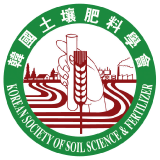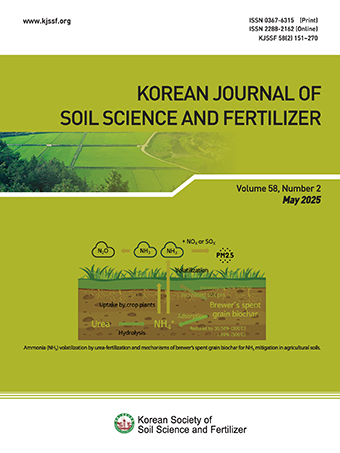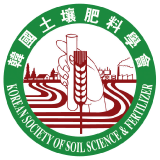Short communication
ATI (Agricultural Technique Institute). 1992. Korean Soil Introduction. Agricultural Technique Institute, Suwon, Korea.
Barak P, Jobe BO, Krueger AR, Peterson LA, Laird DA. 1997. Effects of long-term soil acidification due to nitrogen fertilizer inputs in Wisconsin. Plant Soil 197:61-69.
10.1023/A:1004297607070Benitez E, Nogales R, Campos M, Ruano F. 2006. Biochemical variability of olive-orchard soils under different management systems. Appl. Soil Ecol. 32:221-231. https://doi.org/10.1016/j.apsoil.2005.06.002
10.1016/j.apsoil.2005.06.002Bernstein L. 1975. Effects of salinity and sodicity on plant growth. Annu. Rev. Phytopathol. 13:149-181. https://doi.org/10.1146/annurev.py.13.090175.001455
10.1146/annurev.py.13.090175.001455Bottomley PJ, Angle JS, Weaver R. 2020. Methods of soil analysis, Part 2: Microbiological and biochemical properties. John Wiley & Sons, Inc., Hoboken, NJ, USA.
Casida LE, Klein DA, Santoro T. 1964. Soil dehydrogenase activity. Soil Sci. Soc. Am. J. 47:599-603.
10.1097/00010694-196412000-00004Chang CW, Dregne HE. 1955. The effect of exchangeable sodium on soil properties and growth and cation content of alfalfa and cotton. Soil Sci. Soc. Am. Proc. 19:29-35. https://doi.org/10.2136/sssaj1955.03615995001900010007x
10.2136/sssaj1955.03615995001900010007xDick WA, Cheng L, Wang PJSB. 2000. Soil acid and alkaline phosphatase activity as pH adjustment indicators. Soil Biol. Biochem. 32:1915-1919. https://doi.org/10.1016/S0038-0717(00)00166-8
10.1016/S0038-0717(00)00166-8Eivazi F, Tabatabai M. 1990. Factors affecting glucosidase and galactosidase activities in soils. Soil Biol. Biochem. 22:891-897.
10.1016/0038-0717(90)90126-KEivazi F, Tabatabai MA. 1988. Glucosidases and galactosidases in soils. Soil Biol. Biochem. 20:601-606.
10.1016/0038-0717(88)90141-1Frankenberger Jr, WT, Johanson JB. 1982. Effect of pH on enzyme stability in soils. Soil Biol. Biochem. 14:433-437. https://doi.org/10.1016/0038-0717(82)90101-8
10.1016/0038-0717(82)90101-8Ge T, Nie S, Wu J, Shen J, Xiao H, Tong C, Huang D, Hong Y, Iwasaki K. 2011. Chemical properties, microbial biomass, and activity differ between soils of organic and conventional horticultural systems under greenhouse and open field management: A case study. J. Soils Sediments 11:25-36. https://doi.org/10.1007/s11368-010-0293-4
10.1007/s11368-010-0293-4Gimeno-García E, Andreu V, Boluda R. 1996. Heavy metals incidence in the application of inorganic fertilizers and pesticides to rice farming soils. Environmental Pollution 92:19-25. https://doi.org/10.1016/0269-7491(95)00090-9
10.1016/0269-7491(95)00090-915091407Gomiero T, Paoletti MG, Pimentel D. 2008. Energy and environmental issues in organic and conventional agriculture. Crit. Rev. Plant Sci. 27:239-254.
10.1080/07352680802225456Hong YK, Kim JW, Lee KM, Lee DJ, Lee CR, Kim SC. 2024. Selecting indicator of soil properties to correlate with crop productivity in organic farming system. Korean J. Soil Sci. Fert. 57:35-47. https://doi.org/10.7745/KJSSF.2024.57.1.035
10.7745/KJSSF.2024.57.1.035Hur SO, Jung KH, Sonn YK, Ha SK, Kim JG. 2009. Determination of pedo-transfer function using the relation between soil particle distribution, organic matter and water movement in soil originated from limestone. Korean J. Soil Sci. Fert. 42:132-138.
Joner EJ, Jakobsen I. 1995. Growth and extracellular phosphatase activity of arbuscular mycorrhizal hyphae as influenced by soil organic matter. Soil Biol. Biochem. 27:1153-1159. https://doi.org/10.1016/0038-0717(95)00047-I
10.1016/0038-0717(95)00047-IKandeler E, Gerber H. 1988. Short-term assay of soil urease activity using colorimetric determination of ammonium. Biol. Fertil. Soils 6:68-72.
10.1007/BF00257924Kim JW, Hong YK, Lee CR, Kim SC. 2023. Comparison of physicochemical and biological soil properties in organic and conventional upland fields. Korean J. Soil Sci. Fert. 56:77-89. https://doi.org/10.7745/KJSSF.2023.56.1.077
10.7745/KJSSF.2023.56.1.077Kim LY, Cho HJ, Han KH. 2003. Effects of tile drain on physicochemical properties and crop productivity of soils under newly constructed plastic film house. Korean J. Soil Sci. Fert. 36:154-162.
Kim YH., Kong MS, Lee EJ, Lee TG, Jung GB. 2019. Status and changes in chemical properties of upland soil from 2001 to 2017 in Korea. Korean J. Environ. Agric. 38:213-218. https://doi.org/10.5338/KJEA.2019.38.3.28
10.5338/KJEA.2019.38.3.28Kim YS, Lee YM, Weon HY, Sang MK, Song JK. 2020. Comparative analysis of soil microbial communities between conventional and organic farming systems in pepper cultivation. Korean J. Organic Agric. 28:235-250. http://doi.org/10.11625/KJOA.2020.28.2.235
Lagomarsino A, Moscatelli MC, Di Tizio A, Mancinelli R, Grego S, Marinari S. 2009. Soil biochemical indicators as a tool to assess the short-term impact of agricultural management on changes in organic C in a Mediterranean environment. Ecol. Indic. 9:518-527. https://doi.org/10.1016/j.ecolind.2008.07.003
10.1016/j.ecolind.2008.07.003Lee CR, Kim PJ, Oh Y, Park CB, Park KL, Nam HS, Park GC. 2018. Biomass, nitrogen, and phosphorus productivities of green manure by barley and hairy vetch mixtures. Korean J. Organic Agric. 26:719-729. https://doi.org/10.11625/KJOA.2018.26.4.719
10.11625/KJOA.2018.26.4.719Lee CR, Ok JH, An MS, Lee SB, Park KL, Hong SG, Kim MG, Park CB. 2017. Soil chemical properties of long-term organic cultivation upland. Korean J. Organic Agric. 25:161-170. https://doi.org/10.11625/KJOA.2017.25.1.161
10.11625/KJOA.2017.25.1.161Lee YJ, Choe DH, Kim SH, Lee SM, Lee YH, Lee BM, Kim TW. 2004. Long-term changes in soil chemical properties in organic arable farming systems in Korea. Korean J. Soil Sci. Fert. 37:228-234.
Li J, Cooper JM, Li Y, Yang X, Zhao B. 2015. Soil microbial community structure and function are significantly affected by long-term organic and mineral fertilization regimes in the North China Plain. Appl. Soil Ecol. 96: 75-87.
10.1016/j.apsoil.2015.07.001Liang Y, Wu L, Clark IM, Xue K, Yang Y, Van Nostrand JD. 2015. Over 150 years of long-term fertilization alters spatial scaling of microbial biodiversity. MBio 6:e240-e215. https://doi.org/10.1128/mBio.00240-15
10.1128/mBio.00240-1525852161PMC4453543Loveland P, Webb J. 2003. Is there a critical level of organic matter in the agricultural soils of temperate regions: A review. Soil Tillage Res. 70:1-18. https://doi.org/10.1016/S0167-1987(02)00139-3
10.1016/S0167-1987(02)00139-3Maeder P, Fliessbach A, Dubois D, Gunst L, Fried P, Niggli U. 2002. Soil fertility and biodiversity in organic farming. Science 296:1694-1697. https://doi.org/10.1126/science.1071148
10.1126/science.107114812040197Moeskops B, Buchan D, Sleutel S, Herawaty L, Husen E, Saraswati R, Setyorini D, DeNeve S. 2010. Soil microbial communities and activities under intensive organic and conventional vegetable farming in West Java, Indonesia. Appl. Soil Ecol. 45:112-120.
10.1016/j.apsoil.2010.03.005Mohammadi K. 2011. Soil microbial activity and biomass as influenced by tillage and fertilization in wheat production. American-Eurasian J. Agric. Environ. Sci. 10:330-337.
Nannipieri P, Giagnoni L, Renella G, Puglisi E, Ceccanti B, Masciandaro G, Fornasier F, Moscatelli MC, Marinari S. 2012. Soil enzymology: Classical and molecular approaches. Biol. Fertil. Soils 48:743-762. https://doi.org/10.1007/s00374-012-0723-0
10.1007/s00374-012-0723-0NAS (National Institute of Agricultural Science). 2017. Fertilizer recommendation for crops. Third edition. Rural Development Administration, Wanju, Korea.
Pimentel D, Hepperly P, Hanson J, Seidel R, Douds D. 2005. Organic and conventional farming systems: Environmental and economic issues. Report 05-1. The Rodale Institute, Kutztown, PA, USA.
Puissant J, Jones B, Goodall T, Mang D, Blaud A, Gweon HS, Malik A, Jones DL, Clark IM, Hirsch PR, et al. 2019. The pH optimum of soil exoenzymes adapts to long-term changes in soil pH. Soil Biol. Biochem. 138:107601. https://doi.org/10.1016/j.soilbio.2019.107601
10.1016/j.soilbio.2019.107601Sarapatka B, Dudová L, Krsková M. 2004. Effect of pH and phosphate supply on acid phosphatase activity in cereal roots. Biol. Bratislava 59:127-131.
Schjonning P, Jensen JL, Bruun S, Jensen LS, Christensen BT, Munkholm LJ, Oelofse M, Baby S, Knudsen L. 2018. The role of soil organic matter for maintaining crop yields: Evidence for a renewed conceptual basis. Adv. Agron. 150:35-79. https://doi.org/10.1016/bs.agron.2018.03.001
10.1016/bs.agron.2018.03.001Sun B, Zhang L, Yang L, Zhang F, Norse D, Zhu Z. 2012. Agricultural non-point source pollution in China: Causes and mitigation measures. Ambio 41:370-379. https://doi.org/10.1016/j.envpol.2023.121953
10.1016/j.envpol.2023.12195337307861Tabatabai MA, Bremner JM. 1969. Use of p-nitrophenyl phosphate for assay of soil phosphatase activity. Soil Biol. Biochem. 1:301-307.
10.1016/0038-0717(69)90012-1Van Aarle IM, Plassard C. 2010. Spatial distribution of phosphatase activity associated with ectomycorrhizal plants is related to soil type. Soil Biol. Biochem. 42:324-330. https://doi.org/10.1016/j.soilbio.2009.11.011
10.1016/j.soilbio.2009.11.011Vitousek PM, Naylor R, Crews T, David MB, Drinkwater L, Holland E, Johnes P, Katzenberger J, Martinelli L, Matson P. 2009. Nutrient imbalances in agricultural development. Science 324:1519-1520. https://doi.org/10.1126/science.1170261
10.1126/science.117026119541981Weaver RW, Angle S, Bottomley P, Bezdicek D, Smith S, Tabatabai A, Wollum A. 1994. Methods of Soil Analysis, Part 2: Microbiological and Biochemical Properties. SSSA, Madison, WI, USA.
10.2136/sssabookser5.2Yamagishi J, Nakamoto T, Richner W. 2003. Stability of spatial variability of wheat and maize biomass in a small field managed under two contrasting tillage. Field Crops Res. 81:95-108. https://doi.org/10.1016/S0378-4290(02)00213-7
10.1016/S0378-4290(02)00213-7Yang JE, Cho BO, Shin YO, Kim JJ. 2001. Fertility status in northeastern alpine soils of South Korea with cultivation of vegetable crops. Korean J. Soil Sci. Fert. 34:1-7.
Yao LX, Li GL, Tu SH, Sulewski G, He ZH. 2007. Salinity of animal manure and potential risk of secondary soil salinization through successive manure application. Sci. Total Environ. 383:106-114. https://doi.org/10.1016/j.scitotenv.2007.05.027
10.1016/j.scitotenv.2007.05.02717572477- Publisher :Korean Society of Soil Science and Fertilizer
- Publisher(Ko) :한국토양비료학회
- Journal Title :Korean Journal of Soil Science and Fertilizer
- Journal Title(Ko) :한국토양비료학회 학회지
- Volume : 58
- No :1
- Pages :104-117
- Received Date : 2024-10-18
- Revised Date : 2024-12-13
- Accepted Date : 2024-12-16
- DOI :https://doi.org/10.7745/KJSSF.2025.58.1.104



 Korean Journal of Soil Science and Fertilizer
Korean Journal of Soil Science and Fertilizer








